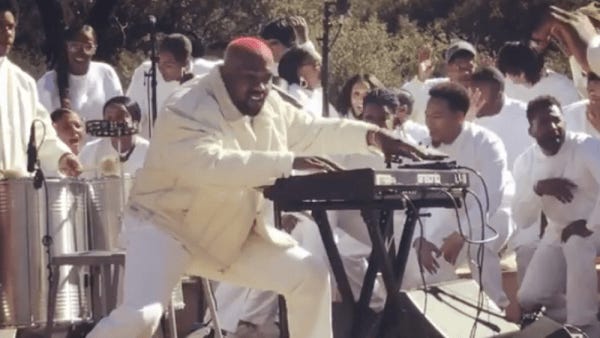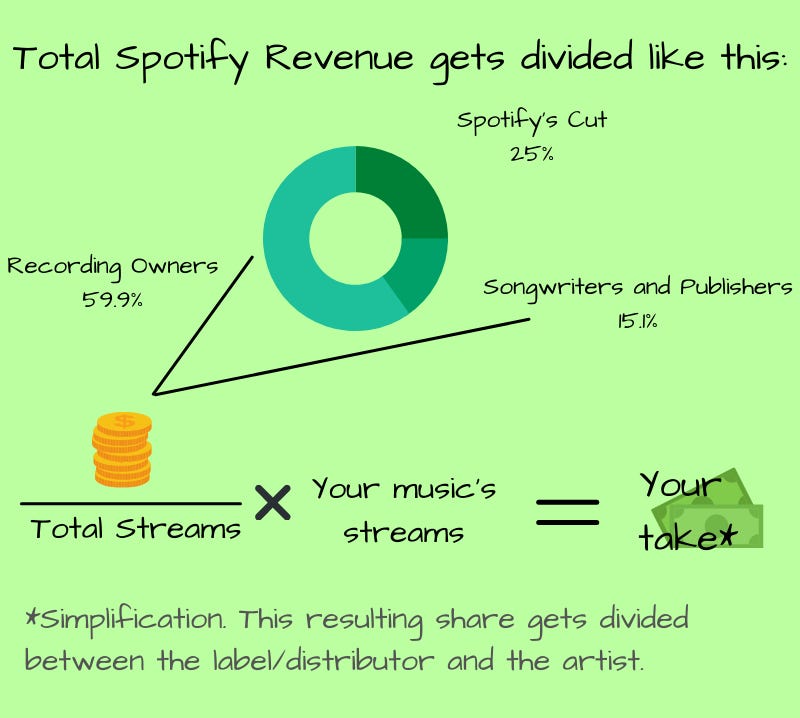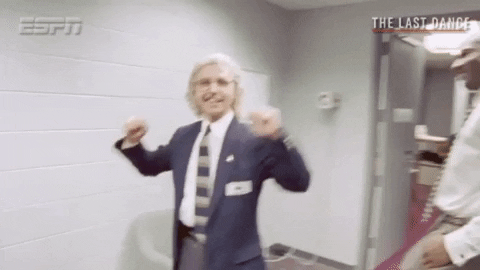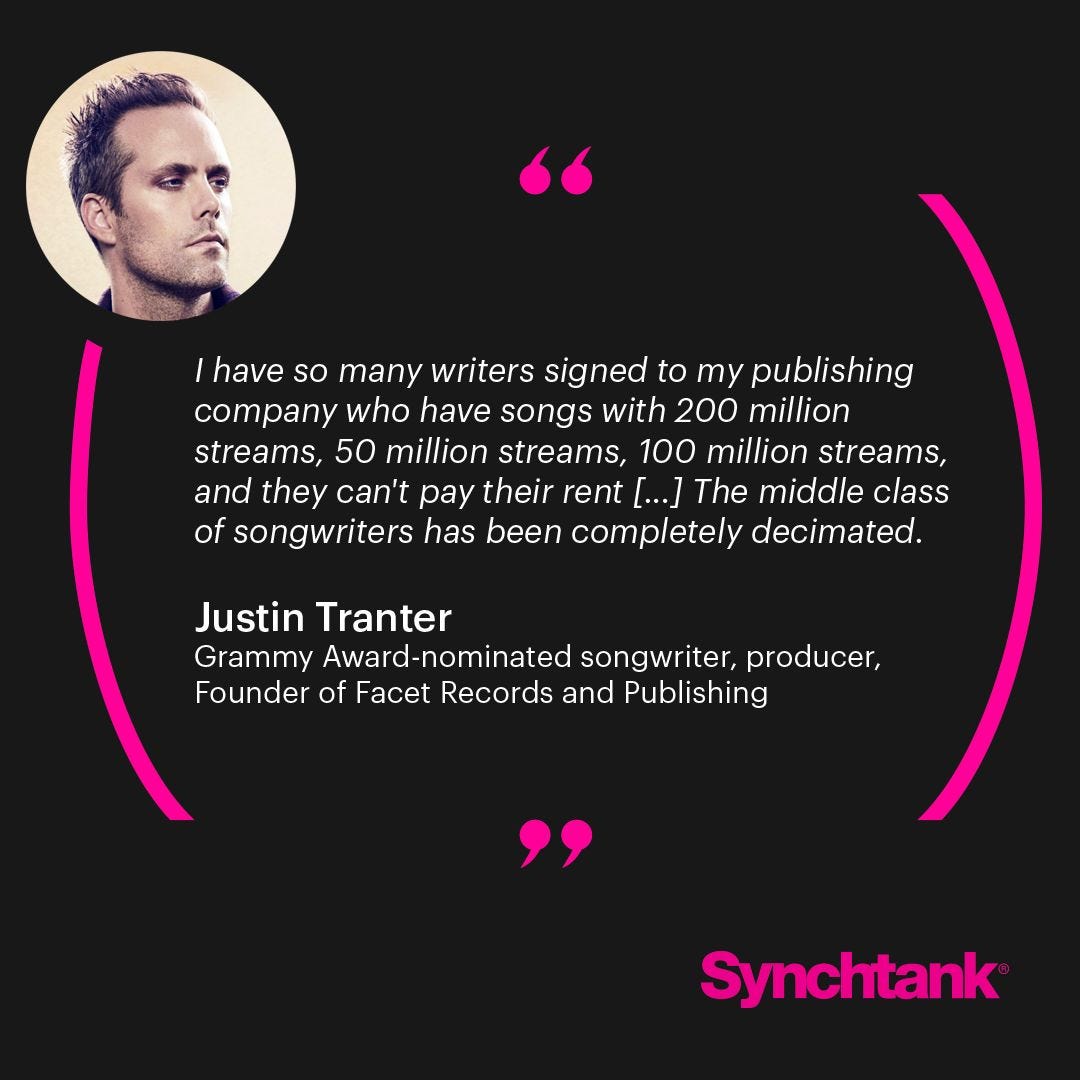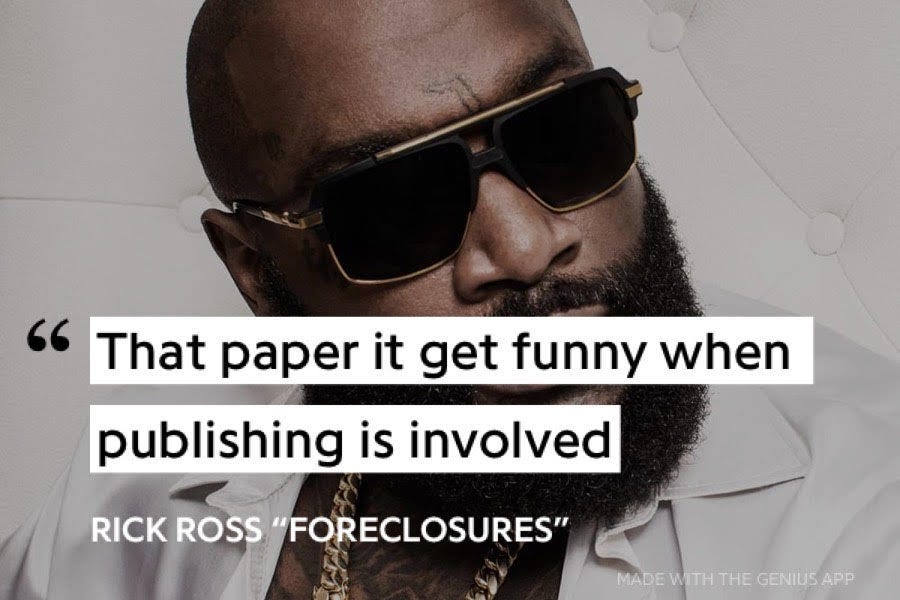I recently gained some new subscribers, so I’m republishing an article I wrote in another publication last July. Welcome to the movement.
If you’ve read this before feel free to ignore it. If you haven’t, be warned, it’s one of my longer pieces.
Ok, let’s get into it.. and Happy Sunday! Don’t forget to set your clocks back by an hour, if you’re in America.. we’re gaining time =)
“Welcome to Sunday Service, if you hope to someday serve us - we got green in our eyes, just follow my Erick Sermon”
Kanye West, ‘New God Flow’
Over the past week, I’ve been doing some reading on the historical relationship between the fashion industry and overseas sweatshops. It’s been quite an eye opener. I’ll let you do your own research, and come to your own conclusions. But it got me thinking. There were stories of underage, and vulnerable, children, women, and men who were essentially forced, coerced, or duped into labor - with overhanging threats made against them.
Some of these threats included (i) threats of bodily harm, (ii) incarceration, (iii) witholding passports and other identification; and (iv) the threat of economic deprivation. It was the last two threats that really got me thinking.. these individuals were, in many cases, being threatened with being “blackballed” if they didn’t cooperate. In many of these cases, these individuals were being paid less than market rates, and even below the poverty line - and they were being told that if they did not accept a less than equitable payment, and work condition, they would be unable to find work elsewhere. To me, this sounded much like what I (personally) witnessed in the music industry; as well what i’ve learned about - word of mouth - and from public commentary.
While there are obvious differences, there are many similarities which lead me to write this article to detail some, by no means a comprehensive analysis, of the power dynamics in the music business. I’ll stay clear of the typical exposé of names and companies - that’s all easy to find in a variety of articles, books, documentaries, and movies.
If you’re still reading - I understand my comparison, although based on my actual experience and the factual commentary of others, may seem harsh.. so here’s some comic relief before I dive in.
THE BUSINESS OF CULTURE
There’s a famous quote by Hunter S. Thompson which goes something like this, “the music business is a cruel and shallow money trench, a long plastic hallway where thieves and pimps run free, and good men die like dogs. There's also a negative side.”
My experience is that this isn’t inaccurate; but i’ll give my routine disclaimer:
There are many good people in the music business.
Ok, got that out of the way.
Part of what makes the music business so tough to navigate is that not only is it a business, largely, built upon relationships - it’s also a business built upon culture.. and randomness.. and people who… never mind.
That said, it’s kind of exciting in a way. There’s the creative energy, the spontaneity; and of course, the lights, cameras, and action (shoutout Mr. Cheeks).
That is, until you start following the money and realize that many people are simply in the way - there’s a lot of smoke and mirrors (this is vital) - and that much of the money goes to the people you don’t see at the shows or after parties..
That said, there’s a reason why “certain types” excel in this business - i’ll talk about hip hop and rappers - but this, obviously, isn’t limited to hip-hop or rappers. It takes a certain grit and worldview to excel in the business of music; and there are obvious examples of this from all races, genders, ethnicities, and nationalities.
As far as hip-hop goes, many rappers and their teams, excel not just because hip-hop is essentially pop culture, generating over a third of all digital streams, and influencing global culture at-large; but I believe it’s substantially because many (definitely not all) come from less than desirable backgrounds and environments; and are often prepared for the politics of the business. Many also bring an innate business savvy that has led to many hip-hop artists trailblazing in the industry when it comes to brand partnerships, equity, and building their own record labels, publishing companies, and business enterprises.
Many may look at an underprivileged background as a hurdle, and it very well can be, but I choose to view it as a competitive advantage. It’s why I wrote my book ‘Born 2 BALL: So You Want to be A Professional Rapper?’ And it’s why i’m writing this article.
This article is a general overview for all incoming artists, rappers, writers, producers, managers, lawyers and executives - as it relates to the music business. Essentially, those who have have not been prepared emotionally and psychologically. See, you can read all the books, take all the courses, and hire the best lawyers; but at the end of the day - I believe one of the most important skillsets to have in the music business is emotional intelligence, grit, street smarts and savvy.
I’ve seen attorneys break down, artists sign horrendous deals - even at the advice of high paid attorneys, managers exiled, attorneys in gross conflict of interest situations, managers promise doe-eyed artists the moon and sign them to unfavorable agreements, and extremely talented artists and producers buckle under the pressure exerted by their peers.
RULES AND ROYALTY
See, the music business is a business of hopes and dreams. It’s not like a technology contract where there are SLA’s (service level agreements) with strict benchmarks and remedies if those benchmarks are not hit. To be honest, no one knows 100% of the time what will be a “hit song” or who will be a “hit artist”. This often leads to the execution of agreements without proper (in my opinion) checks and balances.
Also, it takes much more than money to succeed in the music business - if it didn’t, there would be no such thing as a one hit-wonder.
Let that sit..
Additionally, the recorded music industry is small(er) when compared to other industries, and companies. For example, the recorded music industry generated a little under $26 billion in 2021. If we compare this to the Global Fortune 500 list, this would put the entire recorded music industry at #471, right between ‘China Resources Land’ and ‘Yunnan Provincial Investment Holdings Group’.
‘Paramount Global’, at #465, generated more than the recorded music industry; and ‘Walmart’, at #1, generated around 22x global recorded music industry revenue.
Even if we add the projected 2022 tour-revenue of $26 billion for a combined global total of around $52 billion, this would put us at #205 - between ‘Morgan Stanley’ and ‘State Bank of India’.
‘LG Electronics’, at #192, generated $74 billion.
This is why those artists who are able to break through in the music industry look to leverage their “clout” in other spaces - namely product, and sometimes electronics.
A quick example of this is music super-producer ‘Dr. Dre’ who, along with industry juggernaut Jimmy Iovine (and partners), famously sold their headphone company - ‘Beats by Dre’ to Apple for $3 billion after a sky rocketing run. At one point, ‘Beats’ accounted for more than a third of the headphones market.
Kanye West also recently released his album ‘Donda 2’ via an electronic ‘Stem Player’ which he sold for $200 - noting that he made $2 million the same day - more money than he would have made had it been streamed. An interesting comment made by Kanye was that ‘Donda 2’ would have had to be streamed 500 million times, in one day, in order for him to make that same amount of money.
For context, as of today (July 10th, 2022), Drake has 46 billion streams… from his entire catalog… since the beginning of time.
Remember what I said about trailblazing?
“We in the buildin', but still keep it basement”
Kanye West, ‘Cold’
Back to the matter at hand. The net of all this is that the music business is a hyper-competitive environment where the spoils, in the traditional way of thinking, seemingly go to few victors. This results in people, often, resorting to less than honorable modes of behavior.
One common question that I often get is why do they sign these bad contracts? Why don’t they just read it or have an attorney read the contract?
As an attorney, even though I admittedly didn’t know what an entertainment attorney was until a few months before I started law school, I generally agree - if you’re going into business then it’s ultimately your responsibility to understand the business of your craft and retain wise counsel; but as many music attorneys can attest - things are not always that cut and dry.
ROYALTIES
But before I continue, let me set the scene and briefly explain how revenues are generated in the recorded music industry. To keep it simple - in the music industry, royalties are generated from recorded music whenever music is streamed, downloaded, performed publicly, or synced with a commercial audiovisual property (think commercials, TV shows, and movies).
The royalties from recorded music are secured by Copyright Law which enforces the right of creators to receive compensation from two main legal constructs of a song, commonly known as (i) the sound or master recording and (ii) the musical work or underlying composition.
I won’t go into the details of the benefits of registering your copyrights in this article, but for those creators looking to register their copyrights - you can view this article.
The master recording is the recorded and engineered song you hear when you listen to the radio or your favorite streaming service: this is typically owned or controlled by the distributing record label (this could either be an actual record label or it could be the main artist who is releasing the record independently, or has licensed it to a distributing label).
The composition is comprised of the lyrics and the musical composition of the song itself (think sheet music). It’s not the recorded song itself, but merely the lyrics, musical notes, beats (etc.) which make up the song that is then recorded by the artist.
Here’s a brief example to break it down:
In 1960, Ray Charles released the song ‘Georgia on My Mind’ - which went on to hit #1 on the Billboard Charts. The song that you hear would be classified as the master recording. It’s the recorded and engineered record; but Ray Charles didn’t write or compose the song. ‘Georgia on My Mind’ was written and composed by these guys:
The song was written by Hoagy Carmichael and Stuart Gorrell; and first recorded and released by Hoagy Carmichael in 1930. So, although their version also includes a master recording because it was actually recorded, the composition of ‘Georgia on My Mind’ was created by the two of them, and re-recorded by Ray Charles. Make sense?
This is important (again, a complicated maze that i’ll cover in a different article) because royalties for the master and composition are calculated differently.
In America, the (mechanical) royalty rate for the composition has been set, by statute, for when a song is downloaded digitally or sold physically via CD - and is 9.1 cents. The rest goes to the owner of the master recording.
When it comes to streaming, the rate for the owners of the composition (owned by the writers and producers / composers of a song) has been set by the Copyright Royalty Board, which just set the rate at 15.1%. Royalties from streaming are split something like this:
Simple enough, right? Not really - but hopefully it sets the table to describe the playing field and some of what artists, writers, and producers are up against.
UNDER PRESSURE
Now, let’s get back to business.
In 2021, Variety published an article detailing some of the hardships that songwriters face in the music industry. These hardships generally revolve around the fact that a songwriter’s main income stream is revenue generated from the composition and music publishing. They don’t have the benefit of show and tour income, nor endorsement and brand partnership deals; and, often, songwriters are asked - even when the main artist writes nothing or next to nothing - to take a less than “equitable” split on the composition - further reducing the already minimal (in comparison to many artists) income they receive. The main reasoning for these asks, by artists, is that the artist is the one attracting the listeners; and the songwriter is essentially lucky to be working with the artist. For example, the article notes that, even going back decades, this practice was present - with Elvis’ business team negotiating that he receive one-third of all publishing regardless of whether he wrote one word.
Now, is this a crime? No, it’s a power dynamic.
Some may even say that it’s good business and negotiation - and that if you represent a high-powered client, or any client for that matter, it’s your fiduciary duty to fight for their best interest and secure them the best possible deal - and if i’m being completely honest - if I represented the biggest artist in the world, I would probably negotiate that they still get a publishing interest even if they didn’t write a word; but to my earlier point about sweatshops - at what point does this stop being just “good business” and when does it become more akin to a sweatshop - where uneven power dynamics are exerted by one powerful entity against another, vulnerable, party?
Or does anything go? Is it never too much?
Or do we regulate ourselves to ensure that we don’t cross the line?
Many do, but it’s not not uncommon for artists, producers, songwriters, and managers to be threatened with being blackballed if they bargain too hard for what a reasonable person may think is equitable. This is common practice, especially against vulnerable artists, writers, producers - even managers; and is often the first mode of threat made in the music business. I’ve read about it, heard about it from trustworthy sources, witnessed it myself, and have had such threats made against me.
I’m stubborn though.
Truthfully, these kinds of threats are not uncommon in business - generally speaking; but in an environment as competitive and condensed as the music industry, it can have a devastating impact and ruin careers completely - especially during a time when technology has completely revolutionized the way the business operates and music creators are compensated.
As I touched on in my article - the primary source of recorded music revenue is streaming - so most songwriters and producers aren’t primarily receiving the statutory 9.1 cent rate on $20 CD’s - they’re now receiving 15% of somewhere between $0.0033 to $0.013 per stream on songs where they may only own somewhere between 5% to 50’ish% of that song (due to multiple writers, producers, or artists being on the record). This has had significant repercussions on the industry
Check this out from Justin Tranter, a songwriter who has written for artists such as Justin Bieber, Brittney Spears, Ariana Grande, Selena Gomez, Demi Lovato, and Dua Lipa.
This is an economic reality, exacerbated by technology; but it’s also made worse when people don’t play fair (what’s that?). When you understand how hard it is to make it in the music business, the odds faced by all parties, and then you couple that with intentional obstacles presented by.. let’s say.. *tough* people - it creates a whirlwind of seeming impossibilities.
Here are some real life examples - there was an instance where a former client of mine was approached by someone who was literally living in a motel, and had printed a contract from a website and gave it to this kid to sign - promising him all sorts of things. My client knew next to nothing about the business, and was prepared to sign simply because motel guy “knew people”. I have nothing against people who live in motels, I used to live in my mom’s basement - but i’m just saying, that might not be the best person to sign to for the next five years of your life. Needless to say, after a conversation with motel guy - and my reception of the brunt of his disdain - my client didn’t sign the contract.
And there are so many other stories like this where guys (and ladies) grow up in poverty, uneducated, or unfamiliar with the business and become the next big superstar - - but have their business held up because they signed to someone 5 years ago without understanding what was in the contract.
It even happens to those who grew up fairly well off. I once had a client who came to me and was stuck in tough publishing and management deals that his former attorney negotiated. The problem was that his former attorney was also his former manager’s attorney.
I can’t really get into publishing deals in this article; but there are also numerous instances where producers have signed extensive, long-term, music publishing agreements to people who are not prepared to service the catalog nor present opportunities to the producer - or simply wants to “upstream” and hand off the producer to another company or entity. The producer might have even had a big record, but doesn’t really understand the business - and that you’re only as good as your last hit. The producer thinks that the gates of music business heaven are about to open up to them; but really their catalog is an alternative asset class that is being leveraged by the parties to which he has signed - and as a result, the producer is now contractually obligated to only God knows who - and can’t collect any royalties, because they most likely were paid an advance (on future earnings) which they’ve likely burned through, but most importantly, the producer now doesn’t have much traction in their career because they didn’t realize that it’s not really about the check - it’s about the work - and you need partners who are invested in your business.
I’ve seen guys who have nothing to do with a particular song, but maybe “manage” or are “affiliated” with an artist demand publishing from a featuring artist, writer, or producer; my response is usually something to the effect of "no”.. but again, power dynamics - and artists, producers, and writers are often (whether wisely or not) willing to take certain losses so that they aren’t exiled from certain circles.
Sometimes exile isn’t that bad..
I’ve also witnessed larger producers tell smaller co-producers (who are not on payroll) that they don’t get any publishing (composition ownership) for adding significant pieces to a record - when copyright law says otherwise.
There’s also the dreaded and outdated MDRC deal.
All of this is topped off by the fact that the nature of the music business is such that, often, certain negotiations don’t happen until after the work has been done - giving those with pre-existing leverage even more leverage.
“I do this for my culture, to let 'em know..”
Jay Z, ‘Izzo’
We’re not simply dealing with “it’s just business” here - we’re dealing with power dynamics. And there’s a reason why the government often intervenes in industries, such as finance and education, where there are uneven power dynamics at work.
There’s a clear difference between a business negotiation between two equals or peers; and one where a party is at a distinct disadvantage in wealth, influence, education, or sophistication. But that’s another rabbit hole, and I may write a part three to this article because there are so many other areas where there are uneven power dynamics at work in the music industry - outside of royalties - such as race and gender.
When it comes to artists, writers, and producers in this business - I believe firmly in education, self-empowerment, and “protecting your neck”. Read your contracts and take accountability, but as people - and as an industry - we have to do more.
HYPER-COMPETITIVE
That said, i’m not painting the industry with a broad stroke. I’ve had a lot of great experiences, and have met some of the smartest, honorable and creative people through my time in it. Also, often, it’s the young artists, writers, and producers who jilt their managers and labels - so there’s that.
Another point - much, though not all, of the ill that goes on in the music industry takes place in the dark - in alleys, and obscure corners (or offices… or studios).
What also, often, goes unsaid is that much (maybe most) of the people who receive a paycheck from the recorded music industry complex don’t actually interact with the creators of music - these are corporate / label accountants, financial and data analysts, office and project managers, human resource professionals, information technology and security specialists - the list goes on and on.
These jobs are highly dependent on the revenue generated by recorded music revenue; and not many have the time, bandwidth, knowledge, or proximity to coddle anyone other than their own children - especially not artists who, often, aren’t focused, disciplined, or living in reality..
I can never stress enough that the recorded music industry is primarily interested, and invested, in music and artists that make money.
Or as Jack Nicholson’s character, in ‘The Departed’, would say..
It comes down to money.
And the business is hyper-competitive.
Hyper-competitive for the people who feel locked out of Corporate America and are looking for a way to leverage themselves in, for the A&R’s who are pressured to find and retain the next big artist, for the label managers who have to show a profit, for the executives who have to oversee operations, for the heads of labels who have to report to their CEOs, for the CEOs who have to report to their shareholders, for the shareholders / institutional investors who have to report to the managing director of investment and pension funds, for the managing director who has to report to the heads of their fund… the heads of their fund who have to report to their individual / retail investors… the individual investors who have to report to their families...
…around and around we go..
Everyone reports to someone, and that someone has to make a buck. Someone has a mortgage, or car loans, or student loans, or daycare fees, or a kid’s college tuition, or a spouse that wants to go on vacation, or a parent with assisted living expenses, or is looking to leverage their resume into a higher position at another company, or dreams of starting their own business… or simply wants to make more money.
But unfortunately for artists, producers, and especially songwriters - and any new entrant really - when it comes to the music industry - you may find yourself at the bottom and the back of this long, long… long line; often with no clue of what to do, how to do it, or who to go for it - and that can take you places you don’t want to go..
But the good news is that there is no building with the words “Music Industry” at the front of it - meaning - you can create your own path. Positive steps forward begin by looking within, taking accountability, and asking the right questions.
“The journey of a thousand miles begins with a single step”
Lao Tzu
I haven’t always gotten it right, myself, so I don’t mean to grandstand; but what I do know is that we all have to continually ask ourselves the question - why are we, ultimately, doing any of this?
Or as the scripture says, “what does it profit a man to gain the world and lose his soul?”
So if you’re working in the basement of a music business sweatshop, keep working - be smart - and have faith in God and yourself. Even if you don’t make it in the business, life gets better.
And if you’ve made it out of that sweatshop, remember what it was like for you when you see that clueless young kid walking into the factory.
Let’s end the cycle. That’s the only way any of this changes. We all know hashtags and retweets won’t cut it.
#slumdogmillionaire




